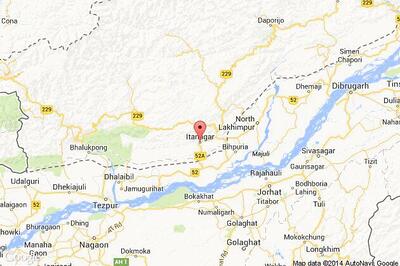
views
Bengaluru is among the fastest-growing cities in India and a major hub for the IT, aerospace, and biotechnology industries. This strong economic growth has attracted a large influx of job seekers and businesses, leading to increased demand for housing and commercial space.
In a primary survey (May 2023) conducted by global real estate consultancy, Knight Frank across eight markets of India, it was found that Karnataka’s capital city Bengaluru has the best of high streets that provide significantly better shopping experience with 4 of its markets making to the top 10 list.
Also Read: The Great Housing Shift: More People Aim To Buy Home Rather Than Living On Rent
“High street” refers to a primary street or main thoroughfare that serves as the central commercial and retail hub of the city. It is typically lined with a variety of shops, boutiques, restaurants, cafes, and other businesses, making it a bustling and vibrant area.
Another report highlighted that with home loan EMIs getting close to rental rates, 65% of tenants are considering buying a property this year. The intent to purchase homes within main city areas is most pronounced among residents of Bengaluru, Delhi-NCR, and Hyderabad.
Also, another report on home-buying behaviour of millennials based out of Bengaluru, found that city’s millennials, who prioritise stability and financial security, recognise the significance of investing in real estate as a way to meet their basic needs while potentially benefiting from long-term value appreciation.
Industry experts Angad Bedi, MD, BCD Group; Navin Dhanuka, CEO & MD, ArisUnitern RE Solutions and Darshan Govindaraju, Director at Vaishnavi Group, highlighted various factors around Bengaluru’s real estate market and its way forward.
Angad Bedi, Managing Director, BCD Group
What are the major trends in the Bengaluru real estate market in 2023?
One of the key trends that is impacting the Bengaluru market is the rising demand for luxury and high-end properties. For example, in 2022 the share of launches in the luxury segment was around 31%, but by H1-2023 the share increased to 40%. This is pushing developers to go for projects which are not only bigger in scale, but are also rich in amenities. Plotted developments are also becoming popular as buyers are keen on upgrading to bigger spaces and plotted developments offer a lot of flexibility.
With a lot of global MNCs expanding in the city, the office sector is also witnessing increased leasing activity. City-wide rentals saw a q-o-q growth of 6-7% amid limited availability of rental options and a rising number of employees returning to the office. Being a tech-city and home to young start-ups the flex segment is also growing and a lot of operators are actively leasing big spaces to expand operations.
Which areas are seeing the most development and investment?
North Bengaluru is emerging as a promising residential location due to fast-paced development. As a result, there is interest from both buyers and developers as far as future prospects are concerned.
Besides, Sarjapur, an upcoming IT hub of Bengaluru is witnessing a lot of activity and the area saw a lot of big land transactions in the last year. Despite the rising land prices, developers are banking on the area and acquiring large chunks of land, either for ambitious housing projects or for plotted developments.
In Bengaluru, Whitefield and Jayanagar are the top two hotspots for the luxury segment which are witnessing NRI investment activity. When it comes to the commercial segment, especially the office, the two prime locations are Outer Ring Road and Whitefield.
What are the average prices of residential and commercial properties in Bengaluru?
According to Bedi, the average prices for residential properties in Bengaluru between the Outer Ring Road and the CBD are between the ranges of Rs 8000 to 15000 per sqft. Prices which were stagnant for about a decade have exponentially jumped now to around 25 to 30 % when compared to the last two years. This continued rise is expected for 2022-23 as well.
Commercial properties in Bengaluru are working directly on a cap of 6 to 8 % based on the rent. The rent in the market is an average of Rs 55 to 95 at A-grade properties. Overall, the IT parks in Whitefield and Sarjapur Road stay very effective in terms of Rs 65 to 85 per sq ft for decent grade A buildings.
Overall, when compared to other metros like Delhi and Mumbai, Bengaluru is still very realistically priced. The value of land, FSI as well and real estate are still undervalued when weighed against the population, the demand in the market and the quality of assets which are being built in the city.
Darshan Govindaraju, Director at Vaishnavi Group
What impact has the COVID-19 pandemic had on the Bengaluru real estate market?
The residential market in the country saw a major recovery post the lifting of lockdown in 2020 and prolonged lower sales in 2019.However, it made a comeback in the mid 2020 with Bengaluru being the key beneficiary.
According to Knight Frank’s “Asia-Pacific Outlook 2023,” Bengaluru has emerged as one of the top real estate markets in the APAC area to watch out for. Out of the 24 markets the survey follows, Bengaluru’s residential market, which is anticipated to increase by 5% yearly, is the second-best. Bengaluru’s population growth and the number of individuals relocating to the city for employment have resulted in increasing housing demand.
What types of properties are in high demand in Bengaluru?
The demand for residential properties, especially larger homes in the city has grown exponentially over the last few years with homebuyers realising the need for larger spaces for work, learning and entertainment purposes, leading to an increasing uptake of mid and luxury segments. Here, premium 3 and 4 BHK properties that come with state-of-the-art amenities and offer peaceful living are garnering a lion’s share in demand.
The first half of 2023 saw a growth for the premium residential segment, as it witnessed a rise across cities. In addition to this, the demand for mid-segment homes eclipsed the affordable segment in H1 2023 owing to shifts in consumers’ preferences and increasing incomes.
The percentage of sales in the mid-segment category grew from 35% in H1 2022 to 38% in H1 2023. Led by the constant inflow of big companies and investors in Bengaluru spelling huge opportunities for entrepreneurship and employment, there has been a significant increase in the inclination of consumers towards luxury housing in Bengaluru too.
Conversely, during the same reference period, the share of annual sales in the Rs 5-10 million and under Rs 10 million ticket-size categories grew from 36% to 38% and 21% to 30% respectively.
What are the key factors driving demand for real estate in Bengaluru?
Bengaluru’s real estate market is experiencing high growth, driven by the IT sector, start-up culture, remote work, and infrastructure development.
High-end and spacious homes are being built to cater to the demand of discerning homebuyers who are looking for quality homes. Infrastructure improvements like new roads and metro lines are expected to improve connectivity and boost property values.
The market is expected to continue growing in 2023 with Bengaluru continuing to attract large MNCs and domestic firms looking to expand their presence.
Additionally, the growth of the startup industry with many companies entering the Unicorn league has led to further growth in residential real estate. The city is also home to organisations like IBM, Microsoft, and Google, who have established large offices in Bengaluru and continue to hire new talent thereby leading to higher demand for quality homes, making it one of the most lucrative markets to invest in.
Navin Dhanuka, CEO & MD, ArisUnitern RE Solutions
How is the Bengaluru real estate market affected by the city’s rapid growth and infrastructure development?
The city’s growth following the IT boom and the subsequent infrastructure development that followed suit, impacted the real estate sector big time. The impact is positive since a lot of new markets emerged and the city saw large-scale developments of residential and commercial projects.
Bengaluru Metro accelerated the developments as connectivity between major IT corridors and residential areas improved. This not only helped the developers regain their confidence but also created a positive buyer sentiment on the back of healthy demand and prospects for price appreciation.
What are the challenges facing the Bengaluru real estate market?
The key challenges are affordability, space crunch and infrastructure. As Bengaluru emerged as a global tech city and home to the top global MNCs, it has become a melting pot of talent, attracting millions of migrants who are making Bengaluru their home. This has not only inflated property prices but also made the availability of space a real issue.
For any new developments, the suburban areas are the only options. Besides, though infrastructure is improving, issues like narrow lanes and traffic congestion are real issues which need to be addressed for the real estate sector to grow.
What are the government’s policies and initiatives impacting the Bengaluru real estate market?
I think since the introduction of RERA the residential sector across all the key markets got a structure that boosted further growth. Besides, the government’s focus towards sustainable housing is also creating new opportunities and builders are banking on the rising interest of buyers towards sustainable homes.
Apart from this, Karnataka one lakh housing scheme is one of the most popular housing schemes launched by the state government. With this Chief Minister’s One Lakh Housing Scheme, the Karnataka government plans to provide shelter to people falling under the economically weaker section. This is also providing a boost to the sector as far as government policies are concerned.


















Comments
0 comment